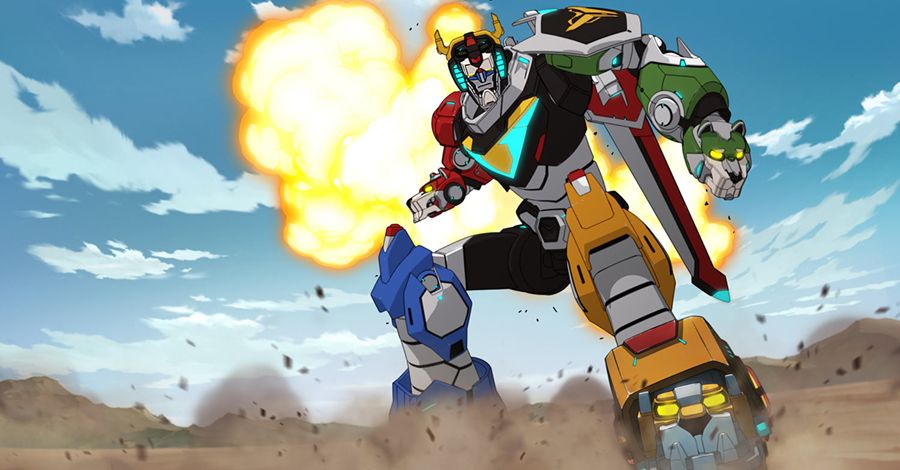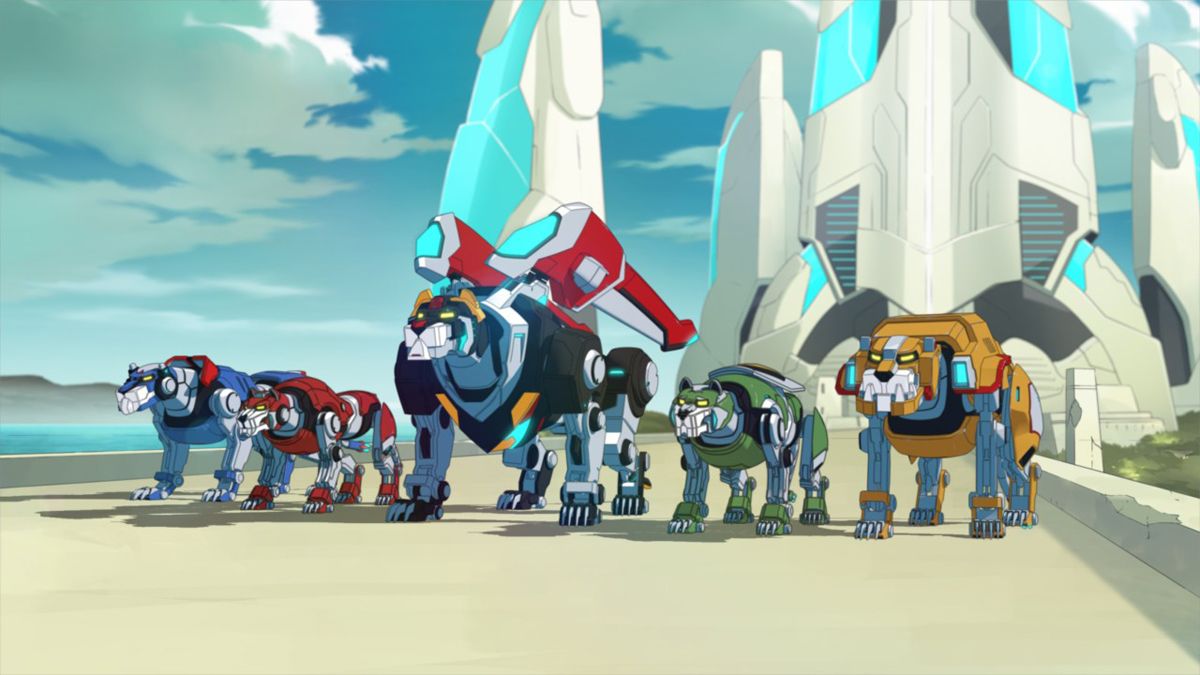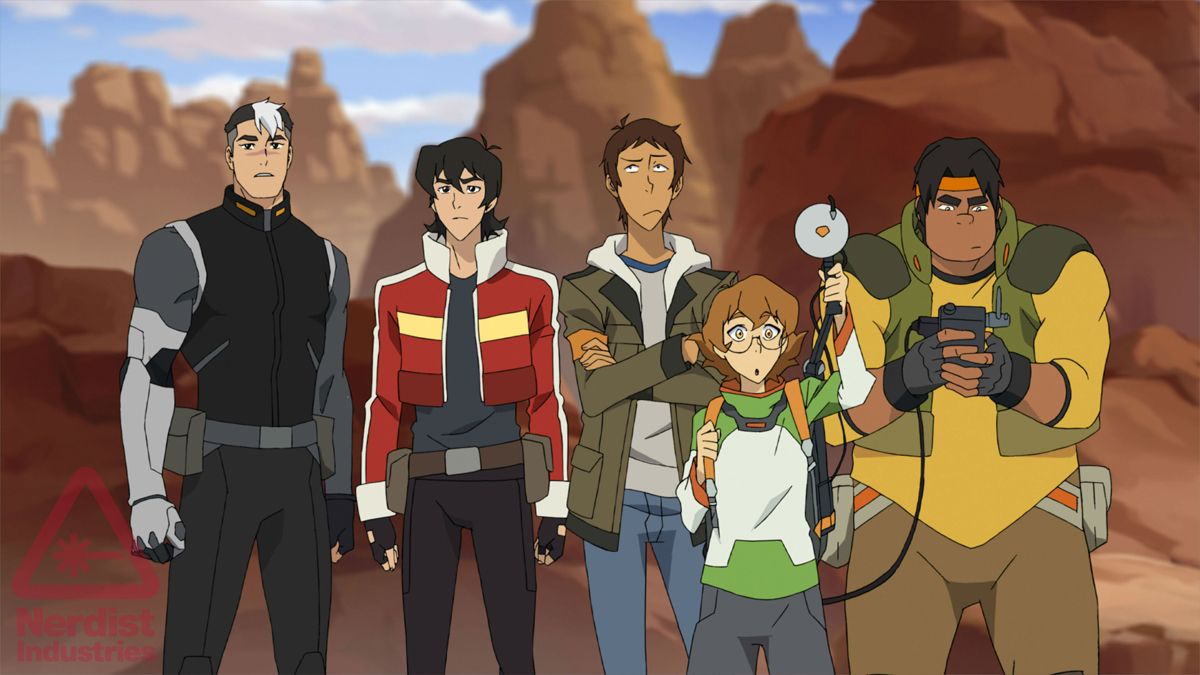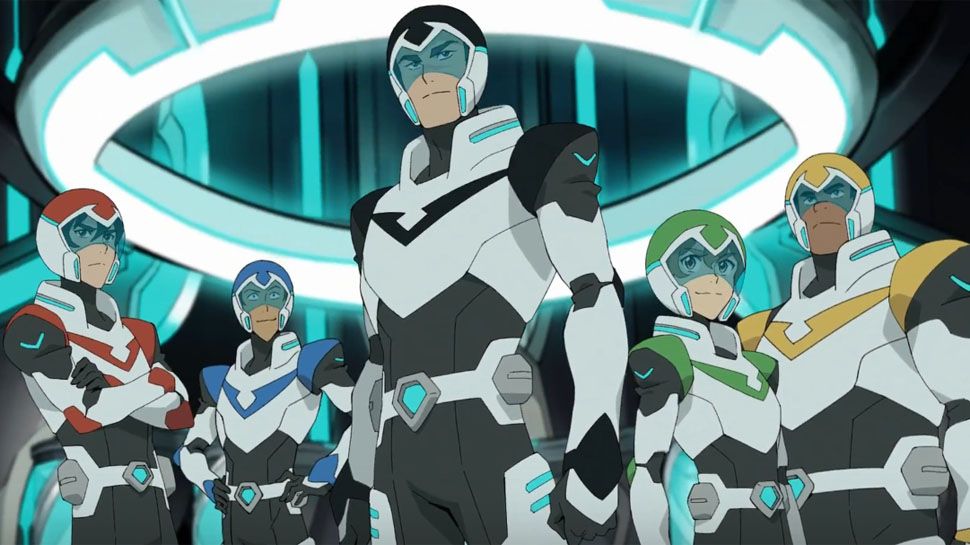Netflix has dusted off Voltron and given him a fresh coat of paint for a reboot of the classic '80s property. New animated series "Voltron: Legendary Defender" follows a team of five unlikely teenage heroes who are forced to band together. They must find five giant robotic lions to reform Voltron and save the galaxy.
That's not so easy, especially when the villainous King Zorkon has spent 10,000 years building forces that can crush Voltron.
Executive producers and showrunners Lauren Montgomery and Joaquim Dos Santos -- both veterans of "The Legend of Korra" -- spoke to SPINOFF about modernizing Voltron, fleshing out the mythology, the cartoon's serialized format and what makes Netflix a good home.
SPINOFF Online: What was your entry point to Voltron? How familiar were you with the property?
Lauren Montgomery: I was barely old enough to have watched it. I really don't remember a ton from those initial viewings when I was young. I just remember a couple of key moments. Beyond that, I remember the robot and the characters. Obviously, growing up in a time before the internet was a thing. so I would catch glimpses of it or someone would mention it. Once the DVDs started and everything was getting rereleased, I bought the DVDs and rewatched them.
Joaquim Dos Santos: I grew up with it. I was the prime target for marketing. I had the toys. Thundercats, G.I. Joe, Silverhawks -- all of that. Voltron was this crazy phenomena. We all watched it, but barely any of us remember its intricacies. I remember Voltron. I remember all the characters. I didn't really remember the storylines. I don't remember individual episodes. It was more these big broad strokes that I remember. I played with the toys on a daily bases, but that other stuff eluded me.
How did this "Voltron" revival come about?
Montgomery: Dreamworks has joined forces with Netflix. They needed to create a lot of content. We had heard rumblings through the animation industry that Dreamworks had acquired the classic Voltron library. We were working on "Korra" at the time, but that was winding down and coming to a close. As soon as we heard that Voltron might be a thing, we wanted to be a part of it. It's something that is remembered very fondly, but we didn't remember the intricacies. There was a lot that could be done in that respect. Nobody really remembers the story, so you can craft a larger, greater story, seeing that there aren't intricate elements you are beholden to.
Dos Santos: We know we had these very nostalgic pillars we wanted to adhere to, but they were really broad strokes. There was a lot of freedom to fill in those gaps. The thing for us is that Netflix really embraces serialization and a continuous story. That's something that we've always really enjoyed working on, but it's hard to come by in animation when you are dealing with television networks. They prefer shows that don't have serialization, that rerun really well --where you can watch any episode in any order at any time -- and know exactly what is going on.
For us, we enjoy telling stories that start in one place and evolve. Characters make decisions that have consequences and reverberate throughout the series. Doing something like that on a network is not easy to do, but Netflix just embraces it. It's the perfect environment for us in our desire to tell these kinds of stories.
It almost sounds like you conceived this as one long movie.
Dos Santos: Like any show that you enjoy, where you have a big storyline you can follow, not every episode is going to pick up exactly where the other one left off. But, you do want to be able to track the main driving force. You want to be able to track changes and characters, both physically and emotionally. We were definitely able to do that. You want to be able to set things up in early episodes that you know are going to pay off later on.
Montgomery: All 13 episodes will all be released on the same day. It's a good thing for us because we are so used to that weekly release schedule. Everyone is going to be a little shell-shocked when it happens because we have been working on this thing well over a year now. In one minute, it's all going to be up and everyone can watch all 13 episodes. It's new for us, but it's also really exciting.
How does having 13 episodes that you can binge-watch affect the pacing?
Dos Santos: It's still episodic in the sense that you can choose to watch 22 minutes, then the credits roll and then on comes the next episode. You do definitely take some pacing things into consideration and you have the luxury of setting story points up early on. You can do like a "Usual Suspects" thing and look back and go, "Oh, that was happening there. We just didn't know it then." It's still episodic content, so it doesn't play continuously. Certain storylines do. Certain episodes do. They pick up where the other left off.
A lot happens in that pilot episode. What did you want to accomplish in the first hour?
Dos Santos: That pilot episodes is all about set up. We wanted our characters to start unaware of what Voltron is, this world that exists beyond Earth, and this battle that's been raging for 10,000 years. It's basically our origin story for our paladins. That was the big thing, just setting up the world, setting up the stakes and setting up what their mission is going to be moving forward. It's about introducing not only a new audience, but the old fans to our version of Voltron.
How challenging was it to give that nostalgic nod to hardcore fans, but also make it fresh and accessible to anyone unfamiliar with the mythology?
Montgomery: Since we are a large part of that older fanbase -- we're super-nostalgic for it -- it wasn't a difficult thing to wrap our heads around. We just knew that if we followed our gut, and if it was something that we would be accepting of, we hoped that main nostalgic audience would also be accepting of it. Of course, there all the people who want to see the old show remade, but we couldn't do that. We needed to do our version of it. To just remake an old show again is kind of pointless. The old series is there for everyone to watch.
The paladins are five extremely different individuals that hold a lot of power and the fate of the galaxy in their hands. What lessons do these fledgling heroes learn along their journey?
Montgomery: Our biggest theme is teamwork. Voltron has always had that underlying theme throughout the original version. We definitely wanted to keep that alive in our version, but in a way where not everyone has to be "the hero." All five of them have to make up a hero. Every member of this team is important and the show can't happen without them. It's not about one hero and he's got four supporting characters. Everyone contributes in an equally important way.
Dos Santos: Another pillar we're really trying to hit -- and it's totally made possible by the fact that we can make a serialized story -- is that these characters evolve and grow throughout the series, and grow to be the fully realized heroes that we all know they can be. They don't necessarily start out that way. They are not all perfect, and they won't ever be perfect, but they will be the best versions of themselves. That was something we really wanted to get across throughout the show.
Who's main villain, and how does he causes trouble for Team Voltron?
Dos Santos: King Zorkon is our big bad of the series as he was in the original. He rules the majority of the universe. Over the course of 10,000 years, he's been taking over. He's been hunting down and searching for Voltron for his own purposes. What we've made sure to do with this version of our villains and characters is give them direct ties to the origin of Voltron.
Princess Allura has been in stasis for 10,000 years -- and her father, King Alfor. We have a huge backstory and lore that ties in that will eventually be told.
Will you be exploring the years Shiro lost while taken prisoner?
Dos Santos: Yeah, that's a huge part of it. The memories coming back to him are a large part of how we reveal the bigger machinations of the bad guys and some story points as well.
Animation has changed so much since the original run. What visual influences were you drawing from?
Montgomery: We were just drawing from not only our nostalgia, but just the fact that we are inherently fans of anime. It's something we grew up with and something we reference a lot in our storytelling style. We used it pretty much over our storyboarding careers. Then, here we are, with a show that was originally animated in Japan and we get to pay homage to it.
Dos Santos: For us, it's in our DNA. We were able to go a little bit more over-the-top and pay homage to those big robot cartoons and storytelling motifs like the split screen and over-the-top screaming when the characters are doing their big moves. That was something that was made available to us just because the property lends itself to those things.
The full first season of "Voltron: Legendary Defender" is available now on Netflix.




